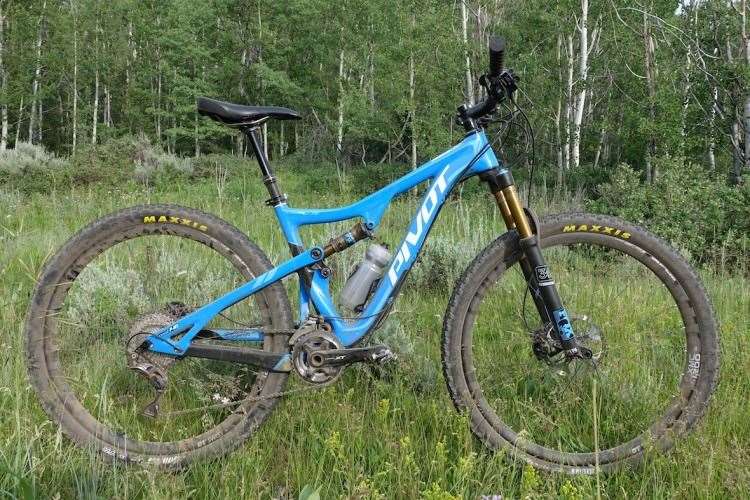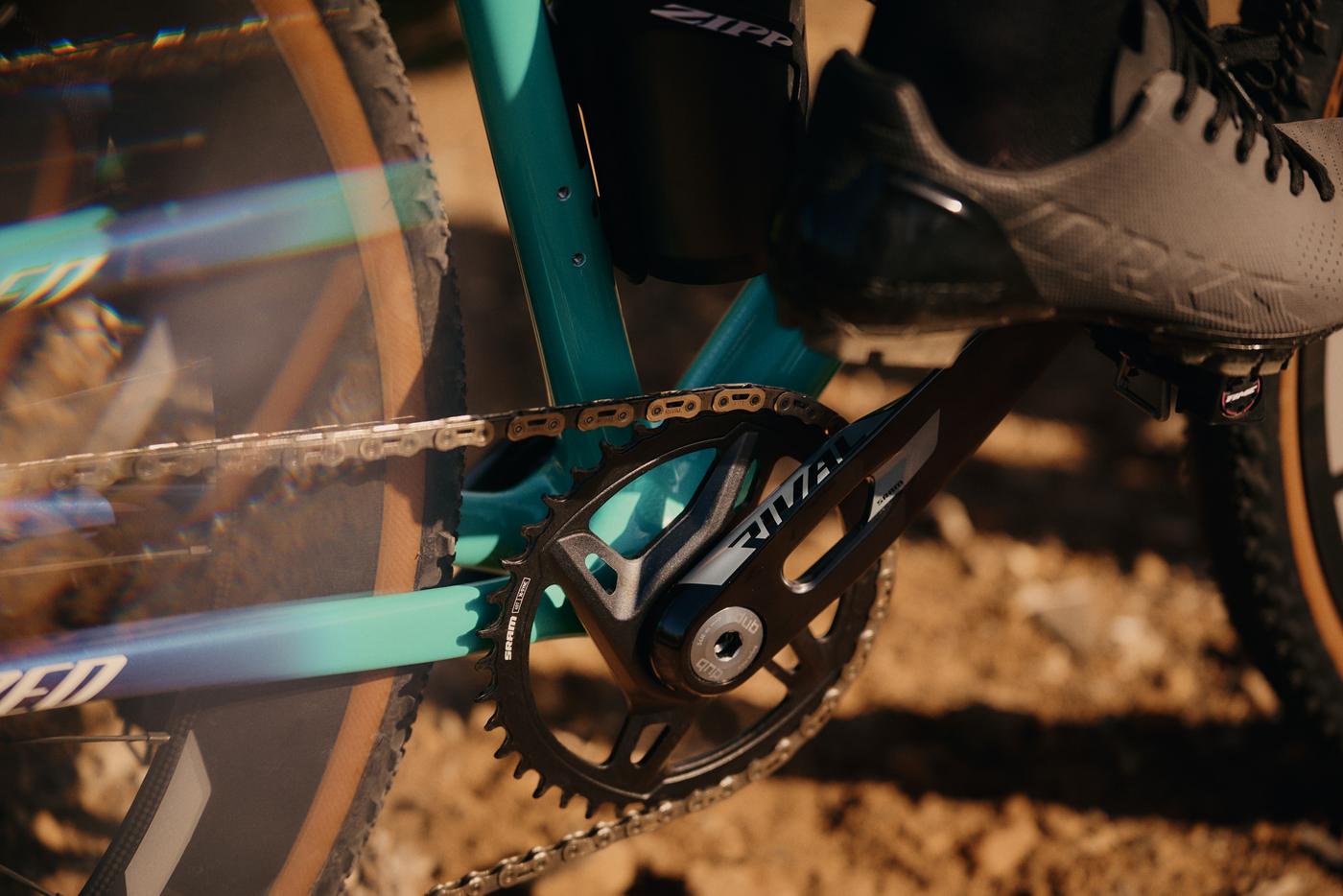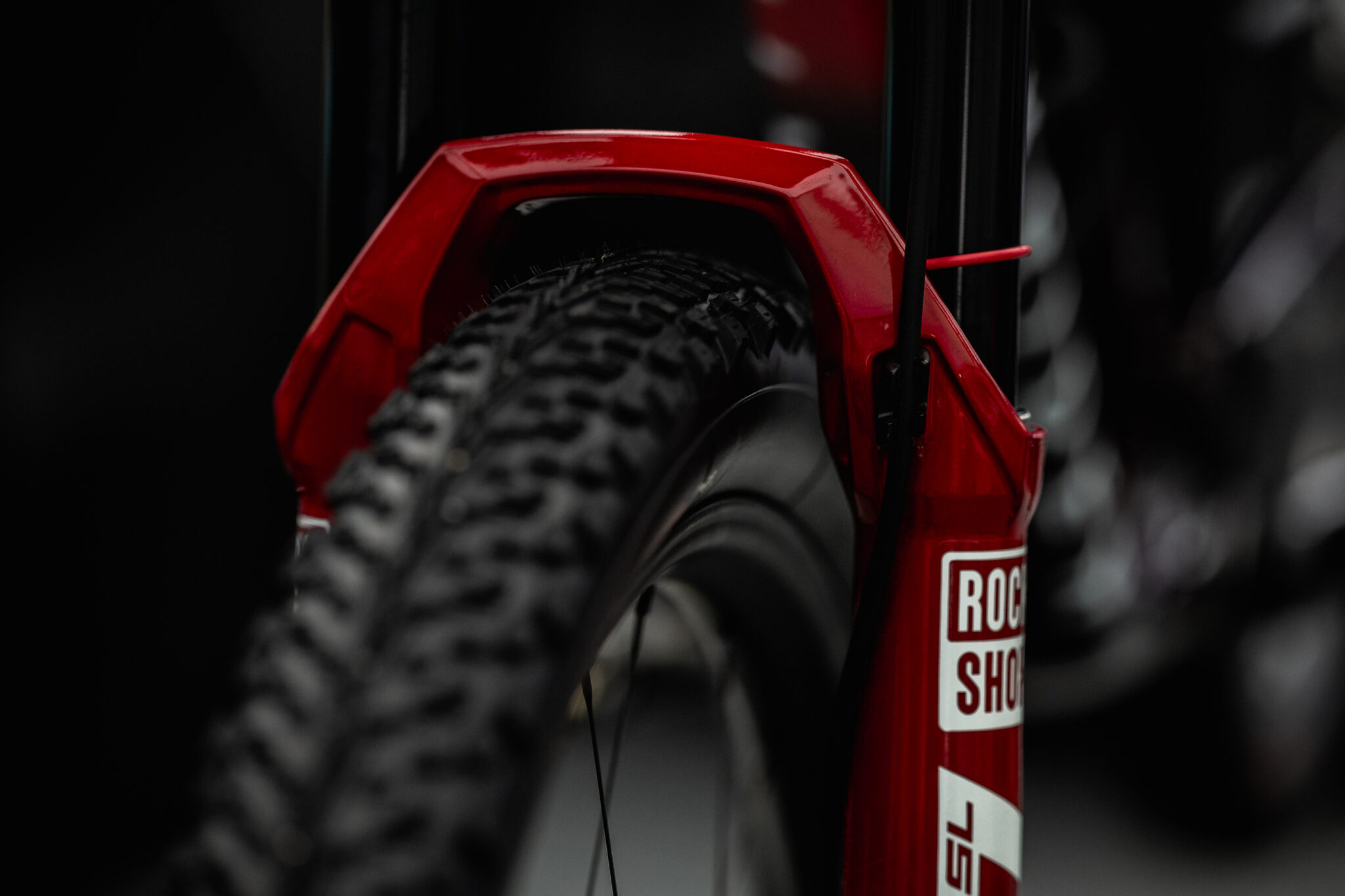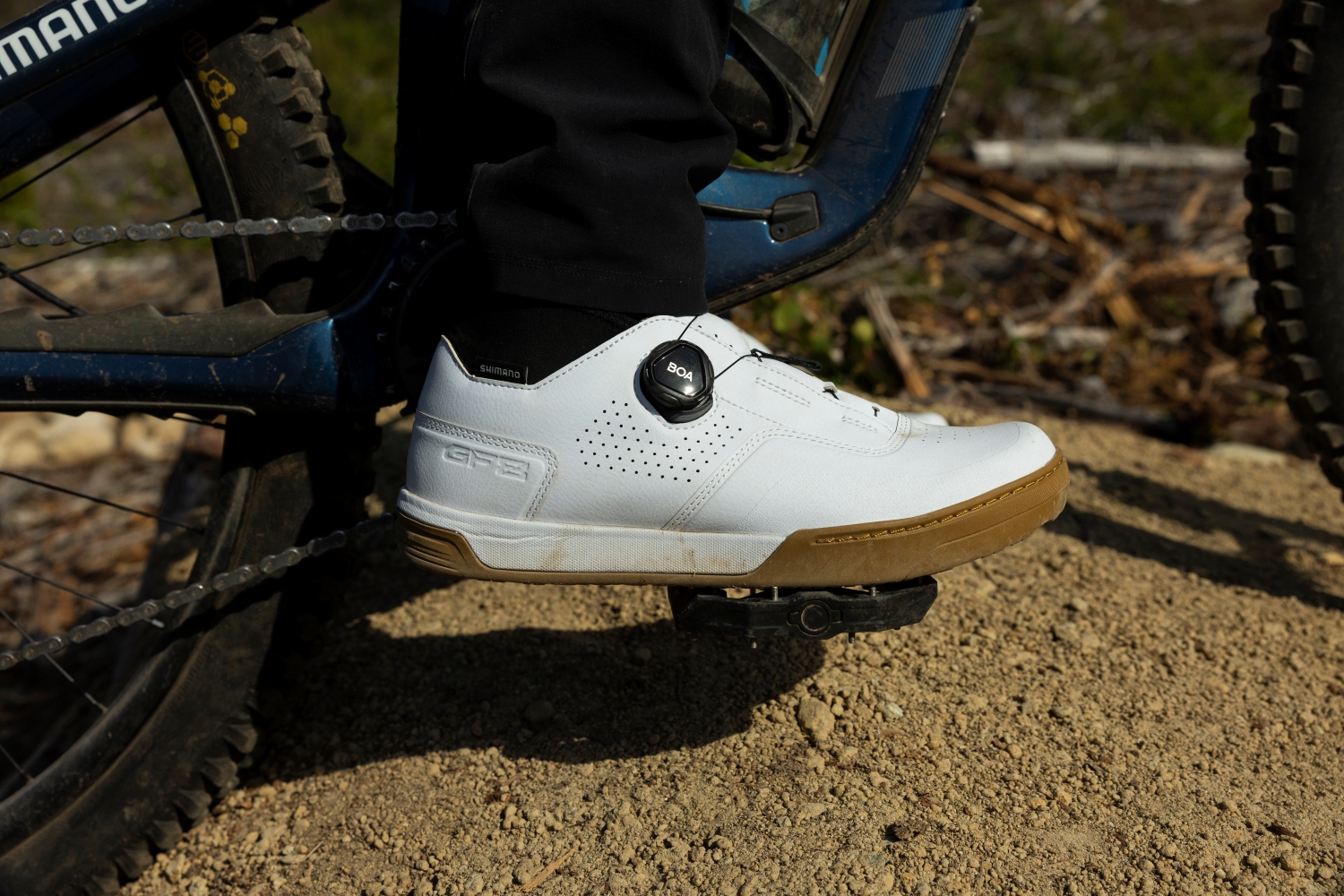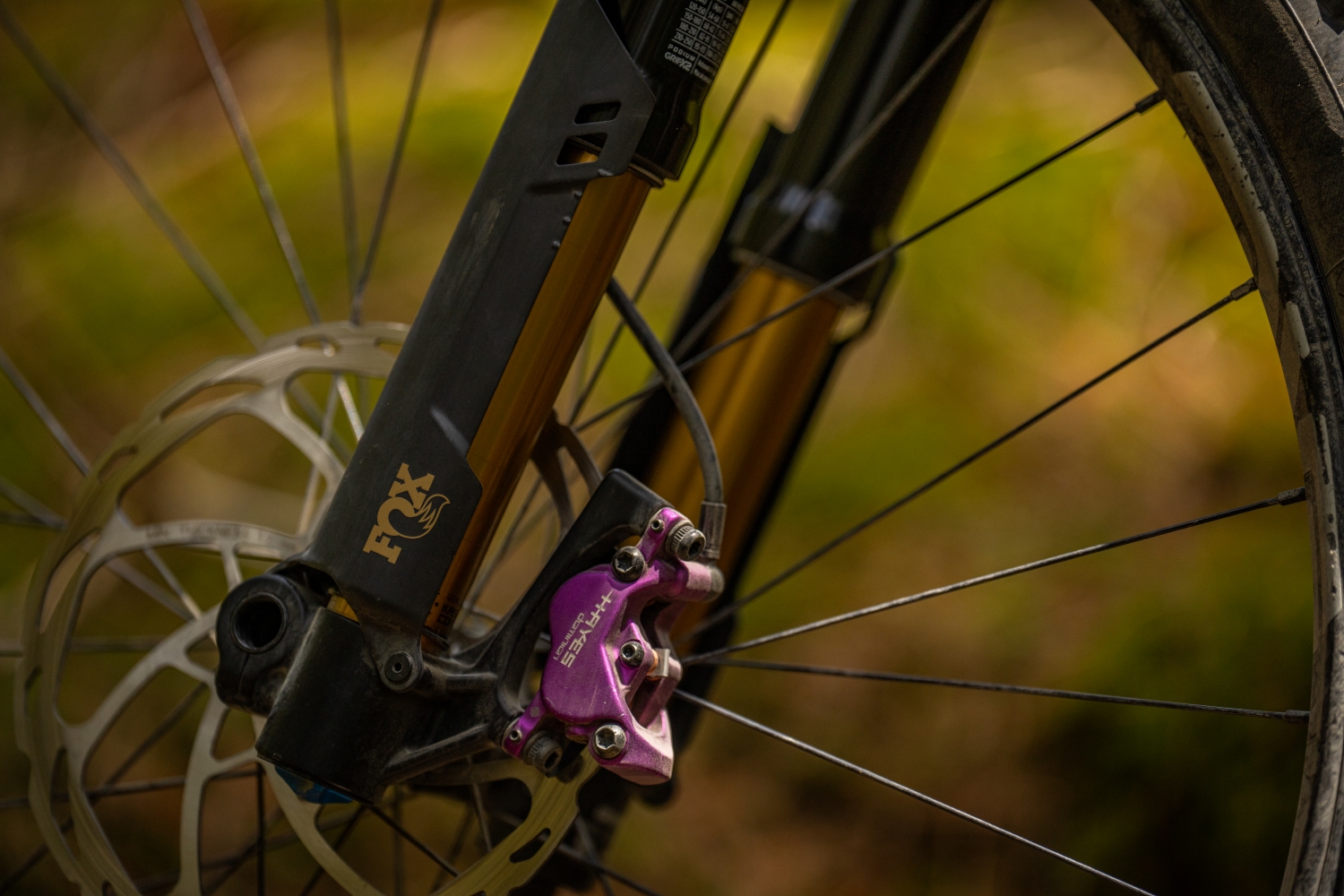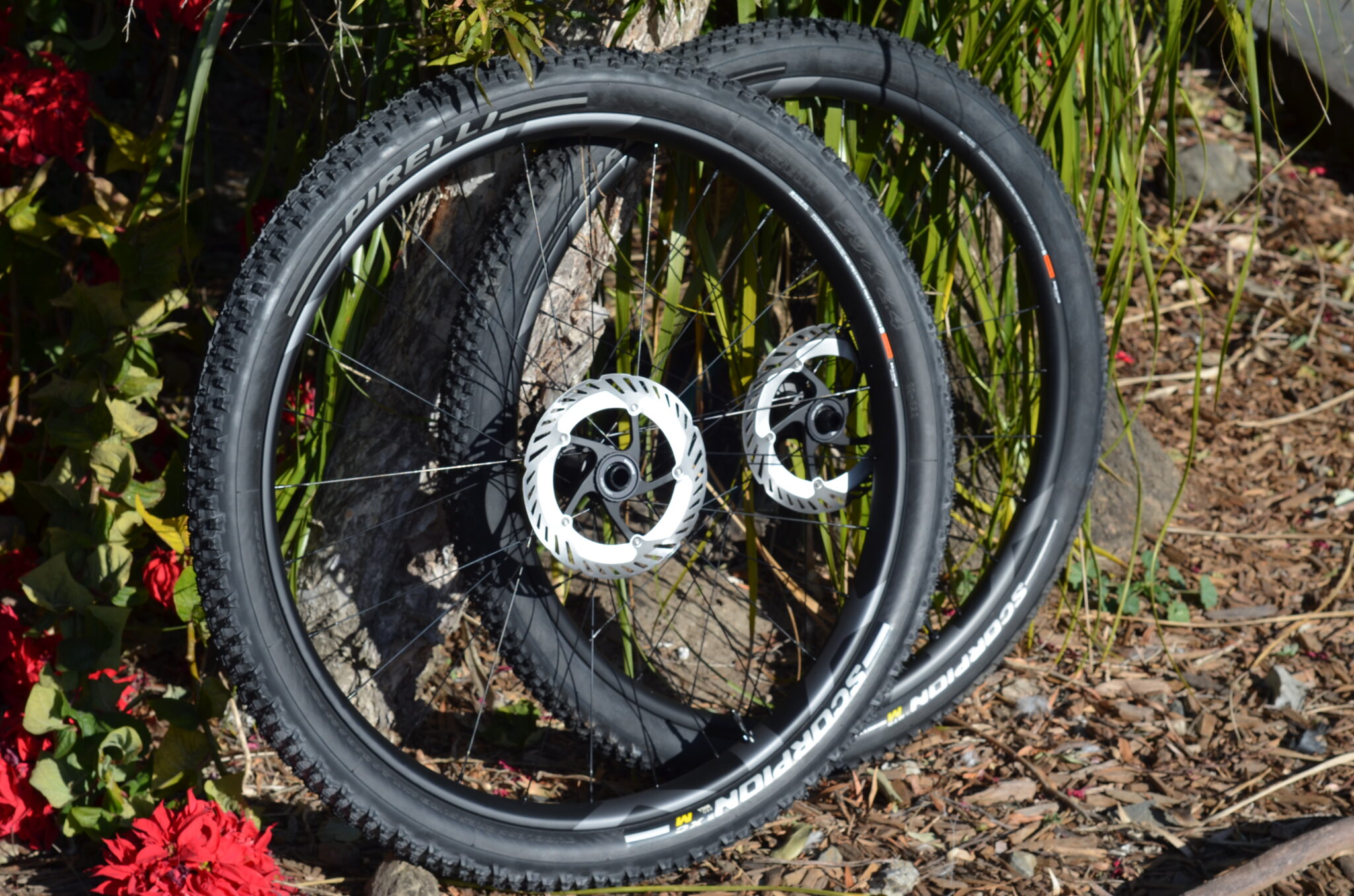First Ride: Pivot Cycles Mach 429 Trail
Just 6 months ago Pivot released the Mach 429 SL for the racers - and now here's the Mach 429 Trail - a complete redesign for the trail shredders. Wil Barrett test ride the new bike in Utah.
A couple of weeks ago, we brought you the news that Pivot Cycles were dropping their all-new Mach 429 Trail bike. The release admittedly came as a bit of a surprise, as Pivot had only just updated the existing Mach 429 Carbon 6 months ago, which saw it evolve into the lighter and sharper Mach 429SL. This answered the calls from the racerboys and racergirls out there, who had been asking for a lighter 29″ dual suspension race bike. Pivot certainly delivered on that front with the Mach 429SL, which dropped frame weight down to just 2.4kg (w/shock), while still making use of the same 100mm travel dw_link suspension design and Pivot’s award-winning 29er geometry. Since its release, the Mach 429SL has been a roaring success for Pivot, both commercially and on the racetrack. As I found out at PressCamp however, the development of the Mach 429SL didn’t exactly go as originally planned…
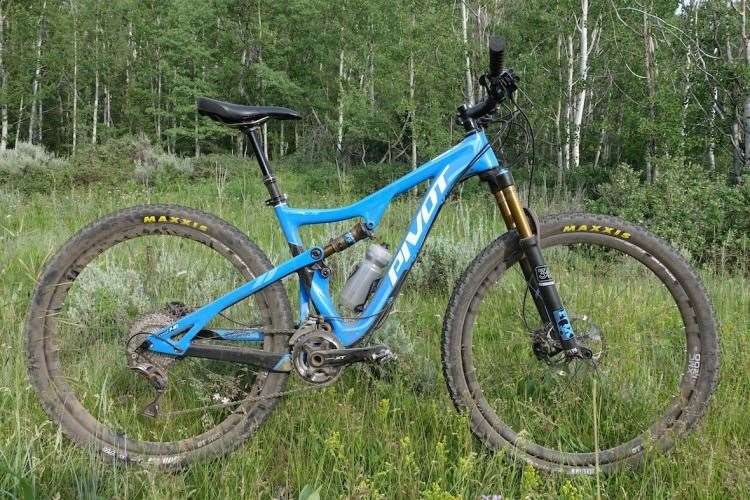
The beautiful blue bike you’re looking at here is the new Mach 429 Trail, which has been in development for around 3 years now. Originally this bike was slated to be the new version of the Mach 429 Carbon, which was first introduced to the world in 2012. One of the key changes to the new bike was a reworked dw linkage design based on the current Mach 6 Enduro bike. As the development progressed however, it became apparent that the bike was evolving in a slightly different way than intended. I spoke with Pivot Cycle’s CEO and head designer Chris Cocalis, and asked him about the new upper linkage on the Mach 429 Trail we were riding at PressCamp. ”We found that the new linkage design added a little too much ‘plushness’ to the 429 to make it a competitive race bike”, Cocalis explained. Rather than abandoning the project though, this realisation allowed them to split the Mach 429 Carbon into two separate bikes, in a similar way that Santa Cruz split the Tallboy into both standard and Long Travel (LT) versions. In Pivot’s case, the Mach 429SL is the superlight race bike, and the Mach 429 Trail is the longer travel trail bike.
It’s a good example of how product development doesn’t always go as planned. “Once we realised the new suspension linkage wasn’t going to suit hardcore racers, we set out to create the 429SL, which had all the same great characteristics of the original 429 Carbon while dropping 226 grams and adding stiffness to the frame as well. This made the new 429SL an even more deadly race weapon” Cocalis explained. And so with the 429SL filling the position as Pivot’s new dedicated race bike, Cocalis was able to return to the original bikes development, with several constraints removed. ”This freed us up to continue to develop the new linkage design into a bike that did not have to also perform XC race duties at the highest level. So we started playing with more travel, and more relaxed angles. The entire process resulted in a lot of different prototype development and testing to get that perfect balance.”
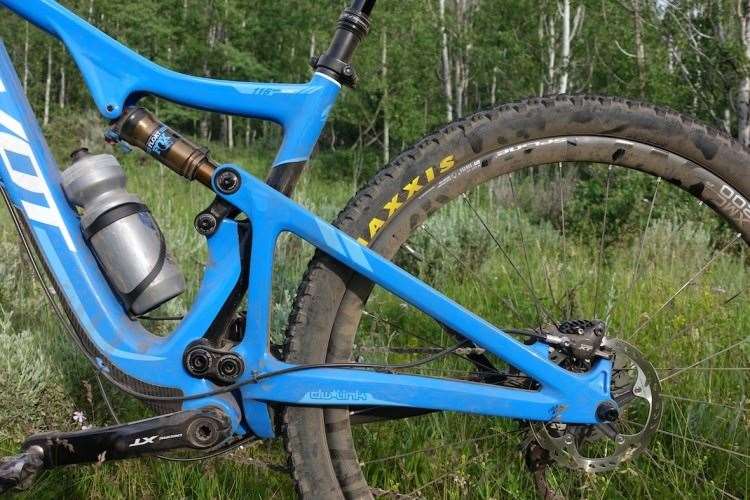
That ‘perfect balance’ is the Mach 429 Trail that you see here, which was released last month during the summer PressCamp event in Park City, Utah. You can read the full run down about the new bike in the official press release, but here’s the skinny: It uses a full carbon fibre frameset with cold-forged alloy linkages. There’s 116mm of travel out back, and it’ll take 120-130mm of fork travel up front. Pivot have specced all of the complete bike options with the 2016 Fox 34 fork to provide a plush and balacned suspension feel, with steering rigidity to match the stout frame. Compared to the Mach 429SL, the 429 Trail runs longer, lower and slacker with a 67.5-degree head tube angle. The frame makes use of modern standards such as the wider Boost148 hub width for the rear dropouts, which has allowed Pivot to shorten up the chainstays nicely. While it’s primarily designed for 29″ wheels, the bike is also compatible with 27.5+ wheels such as the 2.8″ tyres from WTB. All up, it’s designed to be the plushest and most capable 29er that Pivot Cycles have ever built. Of course there’s a whole lot more going on with the new Mach 429 Trail, so read on for all the juicy details along with my first impressions of riding the new bike alongside its creator.
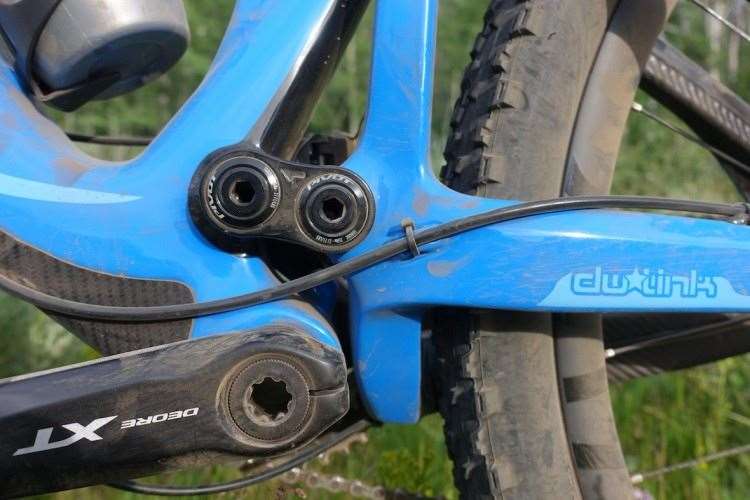 The lower linkage on the new Mach 429 Trail is the same that’s used on the Mach 6 Enduro bike. Super short and super wide, this lower link is packed with high quality Enduro Max bearings that feature tighter tolerances than most other manufacturers. The result is less slop, better durability, and an insanely stiff back end.
The lower linkage on the new Mach 429 Trail is the same that’s used on the Mach 6 Enduro bike. Super short and super wide, this lower link is packed with high quality Enduro Max bearings that feature tighter tolerances than most other manufacturers. The result is less slop, better durability, and an insanely stiff back end.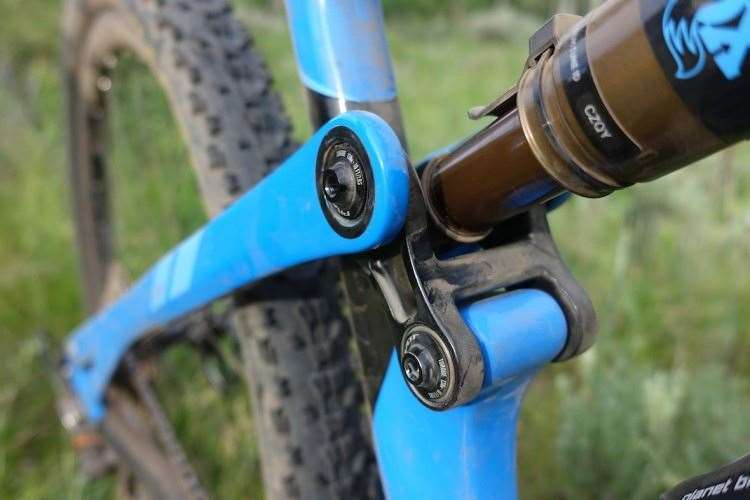 While the lower link is shared with the Mach 6, the upper linkage is entirely new. It’s designed to mimic the plush suspension feel of the Mach 6 and Phoenix, but it does so without need for an additional yoke between the shock eyelet and the linkage. To achieve the right leverage ratio however, Pivot have offset the mounting point for the Fox Float DPS rear shock.
While the lower link is shared with the Mach 6, the upper linkage is entirely new. It’s designed to mimic the plush suspension feel of the Mach 6 and Phoenix, but it does so without need for an additional yoke between the shock eyelet and the linkage. To achieve the right leverage ratio however, Pivot have offset the mounting point for the Fox Float DPS rear shock.As with all Pivot full suspension bikes, the Mach 429 Trail runs on Enduro Max sealed cartridge bearings and custom anodized pivot hardware. The ‘Max’ term for the Enduro bearings refer to the use of a cartridge that is packed full of ball bearings inside, rather than using a bearing cage to separate the balls. As such, Enduro Max bearings have a much higher load capacity then normal cartridge bearings and are designed specifically for use in suspension linkages. What makes Pivot’s bearings unique is the actual bearing tolerances. “Cartridge bearings generally have a standard industry tolerance between the inner and outer casing and the balls that allow for a wide range of press fit tolerances” Cocalis explains. “Pivot specifies a tighter tolerance between the inner and outer race as we also control the press fit tolerances more tightly on the bearing bores in the linkages and frame.” The end result is a more precise fit, and bearings that last longer without developing play. If you look even close, you’ll notice that the bearings specced in the suspension linkages feature special extended inner races on many of our bearings that eliminate the need to use spacers behind the bearings. This means there are less parts, and Cocalis boldly states that “it is impossible to side load the bearings, even if the pivot bolts are over-tightended.” Pretty impressive stuff for a part that is relatively unseen by the average rider.
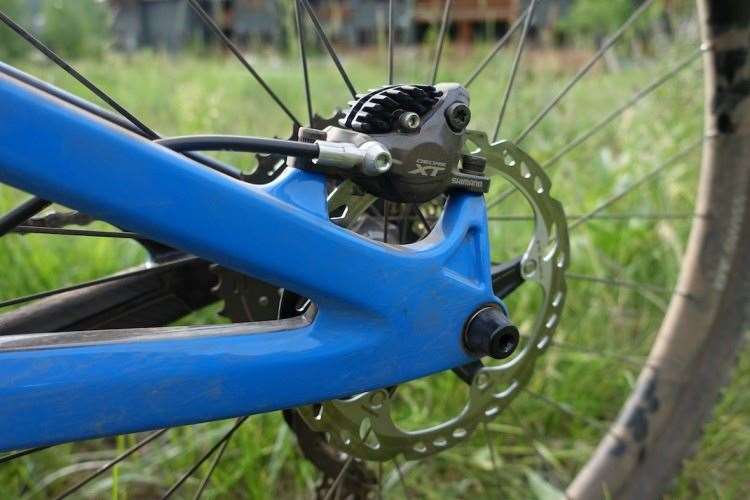 160mm post mount tabs allow for direct mounting of the rear brake caliper. Along with the 148x12mm bolt-up axle, the back end of the Mach 429 Trail is extremely tidy.
160mm post mount tabs allow for direct mounting of the rear brake caliper. Along with the 148x12mm bolt-up axle, the back end of the Mach 429 Trail is extremely tidy.
After learning about the development process behind the new Mach 429 Trail, it was time to get properly acquainted. I’d spent the morning at PressCamp getting fired up about the bikes suspension kinematics and frame geometry, so after lunch I convinced Chris to clear his afternoon schedule to come hit the Deer Valley singletrack with me. Being a mega keen rider himself (and a very skilled one at that!), Chris didn’t take much convincing…
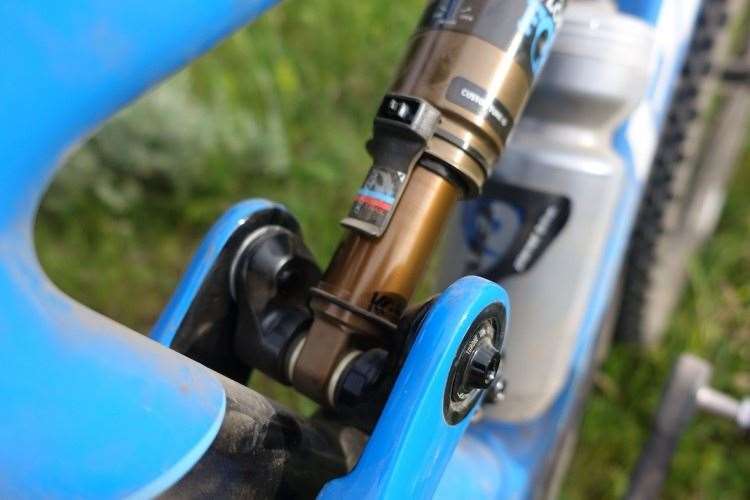
Getting setup on the Mach 429 Trail is just as easy as any other Pivot dually. A clip-on sag guide on the rear Fox shock provides super quick identification of where you need to be. Setting your sag for the blue line printed on the indicator will achieve 25% sag (Race), while aiming for the red line will put you at around 30% for a slightly more supple feel (Trail). For my 70kg riding weight, I settled on around 135psi in the rear shock to get me closer to the red line. Aside from flipping the brakes over (bloody Americans!), my Mach 429 Trail demo bike needed very little tweaking. At 175cm tall, I run a Medium size in pretty much everything. In the case of the Mach 429 Trail, that equates to a 60.7cm effective top tube length, which worked ideally with the stubby 60mm Phoenix stem. Despite having a 130mm travel fork up front, I had no issues with the 740mm wide carbon riserbars, and I had no desire to flip the stem or run a flat bar just to get the grips down. That said, the stout tapered head tube measures just 10cm tall and runs an internal headset to keep the cockpit at a reasonable level even with riserbars.

My first get-together with the Mach 429 Trail was a 3-hour XC ride along the Mid Mountain trail from the Deer Valley resort. This meandering trail runs along the valley ridgeline, with a good combination of climbing and descending ,and a real mix of trail surfaces. The 429 Trail felt immediately comfortable on the trail, with a casual riding position that allows you to easily get in your groove. While negotiating the pine tree roots littered all over the trail, I welcomed the supple suspension feel that erased much of the impact. The Mid Mountain also features plenty of rocky stretches, though the fat 29er Maxxis Ardents had no troubles spinning there way up the steeper pinch climbs on some of the more exposed sections of trail. The bike accelerates as well as you’d expect a dw-link bike would, which is to say it pedals bloody well. As a direct comparison to the Mach 429SL, there is just a touch more sensitivity, but only enough to upset an uptight lycra lout with B-grade racing ambitions. For everyone else out there, this sensitivity results in excellent grip and a very comfortable ride. Thanks to the Boost148 spacing and those shortened chainstays, the Mach 429 Trail handles uphill switchbacks with far more ease than you’d expect for a bike with a 67.5-degree head angle. In fact, it’s one of the best climbing bikes I’ve used for technical ascending.
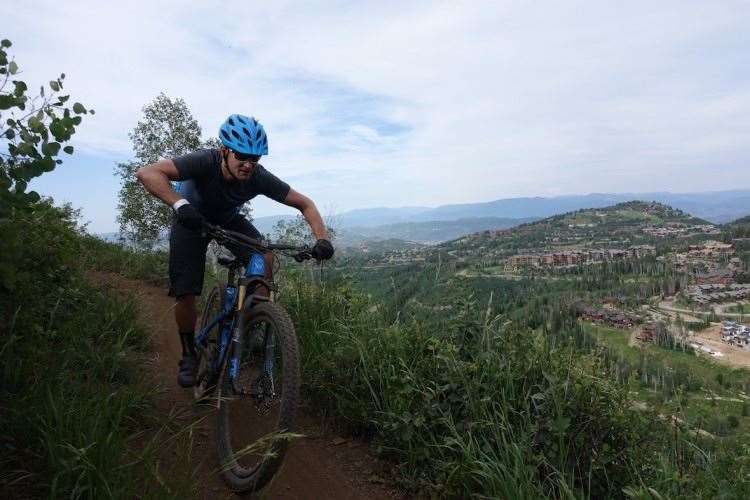
The short back end and the efficient suspension also give the Mach 429 Trail a really ‘poppy’ feel on the trail, which can be a difficult attribute to find on a 29er dual suspension bike. Ignoring that generalisation, the Mach 429 Trail loves to push and pump through ripples along the singletrack, where it exhibits a playful nature that makes you forget how much travel you have or what wheel size you’re on.
After meandering along the Mid Mountain trail, we made our way up the hillside on one of the chairlifts in order to access some more gravity-assisted singletrack. Of course a good trail bike needs to climb well, but the reason you’re choosing this bike over a dedicated XC race bike is because you love to descend too. While I was already diggint eh vibe that the Mach 429 Trail had been laying down, it was during our descent of the ‘Naildriver’ trail where the new bike really blew me away. If it’s any indication of the bikes descending abilities, despite riding in a group of riders who were all on 140mm+ All Mountain bikes, it was the three Mach 429 Trail bikes that were out in front on the way back down the mountain. The Mach 429 Trail possesses incredible cornering abilities that allow it to rip berms apart with confidence and butt-loads of speed. I don’t think there is any one feature that leads to this, but more a combination of the low BB height, short chainstays and the anti-squat nature of the dw-link suspension that allows the front wheel to maintain a consistent arc around the corners without the rear shock getting bogged down. Combined with the stiff frameset and 34 fork up front, the Mach 429 Trail seems to know where you want to go before you’ve even tugged the handlebars. Kudos must be given to the front wheel with its Boost 110mm spacing too, which increases the spoke bracing angle to offer better rigidity to the larger 29er wheel.
As for the 116mm of travel out back, the bike genuinely feels like it has more travel than it actually does, and it’s clearly a case of quality over quantity. There’s a supple feel through the mid-stroke that allows the bike to absorb unsuspecting impacts even when you’re approaching top speed, but Pivot has designed in enough progression to keep the rear end from bottom heavily when you do go a little bigger than you should. In terms of numbers, realistically Pivot didn’t need to go super long on the rear travel, as the large diameter 29er wheels and high-volume tyres go a long way to smoothing out trail irregularities. The resulting benefit of using just 116mm of rear travel is that they could then package the whole back end in a lot tighter to maximise the bikes handling. And that leaves you with a bike that is more playful, more versatile and arguably faster on the trail too.
 After our trail ride, CEO and lead designer, Chris Cocalis, took me through the development of the new Mach 429 Trail. Cocalis is a meticulous engineer with a passion for suspension and innovative frame design, and he has a very hands on approach with the testing and prototyping of each new bike that Pivot builds.
After our trail ride, CEO and lead designer, Chris Cocalis, took me through the development of the new Mach 429 Trail. Cocalis is a meticulous engineer with a passion for suspension and innovative frame design, and he has a very hands on approach with the testing and prototyping of each new bike that Pivot builds. Cocalis co-developed the PF92 standard with Shimano back in 2007 on the original Mach 4. The 92mm wide bottom bracket shell adds masses of stiffness to this key junction point, along with the ability to run wider linkages too. Worried about a creaky bottom bracket? Cocalis states that it’s all in the tolerances used at the factory – Pivot uses much tighter tolerances than the competition for a precise fit that results in quiet crank spinning with better bearing life too.
Cocalis co-developed the PF92 standard with Shimano back in 2007 on the original Mach 4. The 92mm wide bottom bracket shell adds masses of stiffness to this key junction point, along with the ability to run wider linkages too. Worried about a creaky bottom bracket? Cocalis states that it’s all in the tolerances used at the factory – Pivot uses much tighter tolerances than the competition for a precise fit that results in quiet crank spinning with better bearing life too. There’s a lot of subtle tube shaping going on with the carbon frame on the Mach 429 Trail. Note the offset lower linkage that makes room for the side-swing front derailleur. Don’t use front derailleurs? The mount is removable for a super clean look with 1x drivetrains.
There’s a lot of subtle tube shaping going on with the carbon frame on the Mach 429 Trail. Note the offset lower linkage that makes room for the side-swing front derailleur. Don’t use front derailleurs? The mount is removable for a super clean look with 1x drivetrains.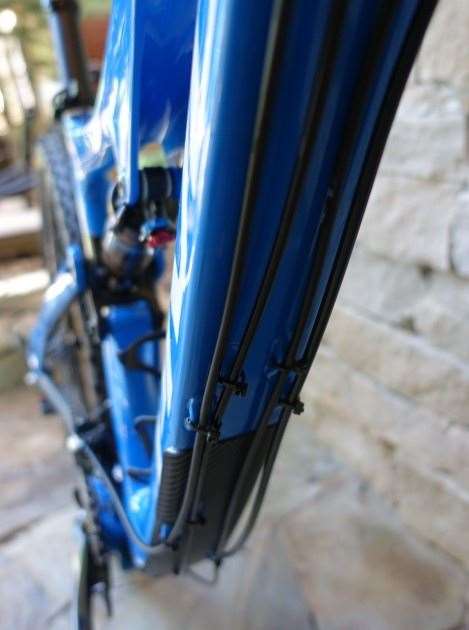 To keep the frame cost down, Pivot elected to use external cable routing on the Mach 429 Trail. The frame is about 280 grams heavier than the Mach 429 SL, but it also comes in a couple of hundred bucks cheaper too.
To keep the frame cost down, Pivot elected to use external cable routing on the Mach 429 Trail. The frame is about 280 grams heavier than the Mach 429 SL, but it also comes in a couple of hundred bucks cheaper too.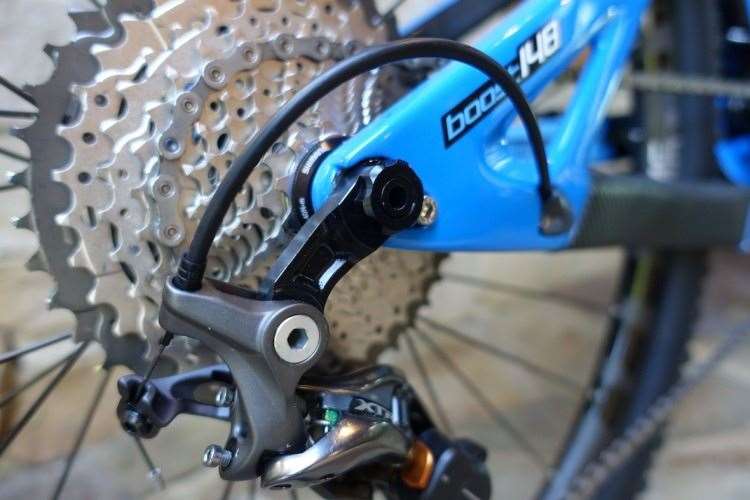 Boost148 spacing out back sees a wider 12mm thru-axle employed that allows the use of wider-flanged rear wheels for added rigidity. Pivot also spec a direct-mount rear derailleur hanger on their Shimano build kits.
Boost148 spacing out back sees a wider 12mm thru-axle employed that allows the use of wider-flanged rear wheels for added rigidity. Pivot also spec a direct-mount rear derailleur hanger on their Shimano build kits.
And there you have it – our first impressions of the new Mach 429 Trail. As you can tell, I was damn impressed with the ride quality that Chris and his team have been able to eek out of the Mach 429 platform. The geometry is dialled, and the use of standards such as the Boost hub spacing and PF92 bottom bracket has allowed Pivot’s engineers to create a highly capable frame with sharp handling on the trail. The 429SL is still the choice for marathon racers and weight weenies, but for those who value trail riding over competition, the Mach 429 Trail is more capable and more fun too.
The Mach 429 Trail is due to arrive in Australia this September, with frame pricing expected around the $3500 mark. For more information on the new bike and to find your nearest Pivot dealer, get in touch with Jet Black Products for the low-down. You can also read more about the Mach 429 Trail on the Pivot Cycles website.

